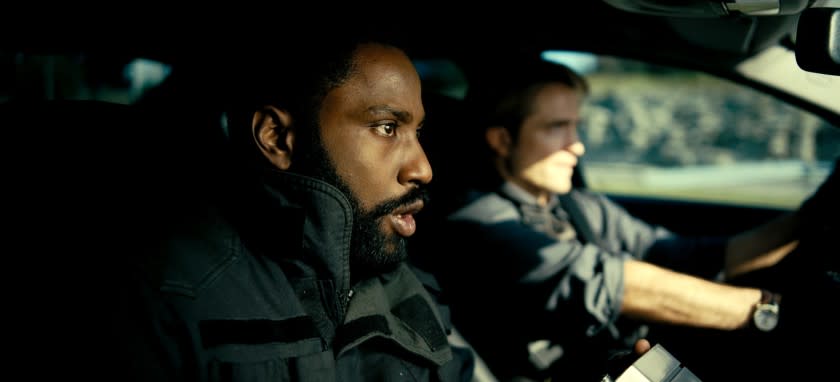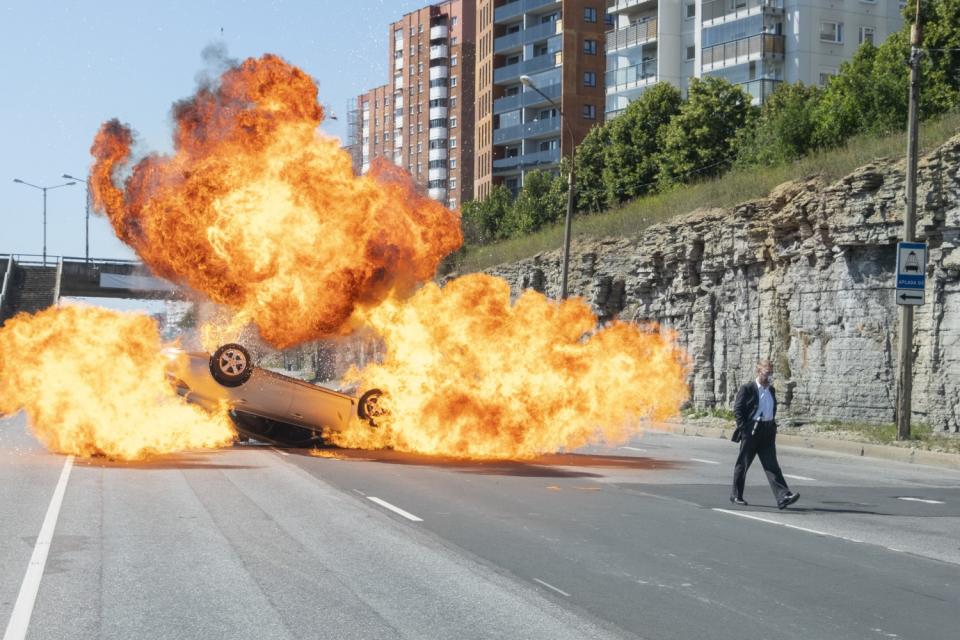How real is the science in Christopher Nolan's 'Tenet'? We asked an expert

Like many of Christopher Nolan’s films, “Tenet” centers on a supposition that comes out of real science. Where “Interstellar” looked at wormholes and time travel, “Tenet” questions whether it’s possible to invert the entropy of an object — or a human — to allow it to move backward through time. In writing “Tenet,” Nolan took some suggestions from physicist Nobel laureate Kip Thorne, who also advised on “Interstellar,” but ultimately the filmmaker decided to forgo some elements of reality. “I did have Kip Thorne read the script and he helped me out with some of the concepts, though we’re not going to make any case for this being scientifically accurate,” Nolan noted in the film’s press notes. “But it is based roughly on actual science.”
To find out how much science is behind the action of “Tenet,” we enlisted professor Claudia De Rham, a theoretical physicist from Imperial College London, to discuss some of the key plot points and break down whether we’ll ever live in a world where time inversion is possible.
Warning: Major plot spoilers ahead. If you haven’t yet seen “Tenet” (and most of us haven't!), we suggest reading this review or this piece on some eager fans instead. And come back when you’ve seen it.
What did you think of “Tenet”?
I like a good science fiction movie and I like a good action movie. For me, it was a little bit too much of the science fiction being an excuse for action and setting scenes. It was trying to be clever without really being clever. It’s science fiction, so I understand: “We want to make a movie and we don’t need it to be physically possible.” I can accept that, but it was maybe a little bit too much for me — the plot didn’t quite make sense. It was harder for me to appreciate it as much as other movies of the same style.
Overall, how does the science hold up?
There is some element of physics. There is some element of science. It’s trying a little bit. Compared to previous movies, like “Interstellar,” the gap is maybe bigger. It’s far less grounded into physics. There are a lot of times where they use science jargon and it’s just jargon with no content. If you look at “Interstellar” and other movies like that, there’s a little bit more depth. … Not everything is completely wrong. It is true that you think your clock is ticking, that the way you feel time is evolving. This is related to the notion of entropy and it’s not necessarily incorrect to say that if you could reverse or invert your entropy maybe you could think of things going backwards in time. That element you can accept. But the consequences were not at all explored in a way that made sense.
On a basic level, what is entropy?
Entropy is the measure of the level of order or the level of information. There’s a really fundamental law in physics telling us that entropy always increases. On average, things get more and more disorganized. That’s why we grow older — our body gets slowly more and more disorganized. That’s why it’s much easier to destroy something than to construct something. At the physical level, if you have a box and you put some gas in it, the gas will start taking up the whole space. It will spread and get more and more disorganized. When entropy increases, it means things are becoming less and less organized.
If you have an object, like a bullet, is it possible to invert its entropy?
A fridge, for instance, is a device where you lower the entropy so that things are cooler — when things are cooler they have less entropy. If you think of ice, it’s cooler and static and well organized. When you heat it up, the entropy increases and it becomes liquid and then it becomes a gas and it becomes less organized. A fridge or a freezer inverts it for you. So we know that it’s very possible to have devices that reverse the entropy. But it doesn’t mean that time goes the other way in your fridge. When I put food in my fridge it doesn’t get fresher and fresher every day. But it’s definitely possible to have a device that decreases the entropy of an object. The connection with having the internal clock of that object going backwards is a little bit of an extrapolation. But that’s part of the poetry, right? That’s the fiction in the science fiction.
In the press notes for the film, Nolan says that all laws of physics are symmetrical except for entropy. Is that true?
That’s mostly true. For most laws of physics, there’s a time symmetry. Anything that can move forwards, you can think of it moving backwards. Entropy is the only thing we experience — so we associate it with the way we experience time — in one direction. As a whole, entropy always increases as opposed to decreasing. So you can imagine an alternate world where entropy always decreases and everything goes the other way as opposed to us. People in the alternate world would be living the other way. That’s fine by itself, but when you start making the interaction and making contact with that world then it doesn’t make sense from a physical point of view.
If a person could move backward through time, would they be unable to breathe normal air?
The way you breathe is that you have a balance between the oxygen in your lungs and that in your body. It’s true that if you have time going backwards you want the inverse process to happen as well. So it is true, I think, that you would need to bring your own air with you. So if you want to move backwards in time you’d need to take your air with you, but you’d also need to take everything else with you. The way you see an object, or someone else, you have the light coming from the sun, hitting that object and then coming back at you. You see the object because the light hit the object and then it hit your eye. But if you are immersed in what you think is a backwards world and you haven’t taken all light with you, then you would have the impression that first light comes out of your eye, hits the object and then hits the sun. So you wouldn’t see the object. You would just see the light first.
So moving backward through time would be a real struggle.
It would be a struggle. While it is true that you would need to take your air with you, you would need to take so much more with you. Like the car. He goes backwards, but the car didn’t go through the machine and the car is moving backwards with him. He would need to take the car with him [through the device].

And if there was an explosion while you were moving backward, like in the car chase scene, would that result in ice rather than fire?
That’s absolutely not what would happen. It’s like saying, “If something was white it would become black.” It’s not like everything becomes the opposite of each other. The reason we feel heat is because molecules in the air hit a surface. That’s what we feel, the constant hitting of particles on us. If [the molecules’] time went backwards with respect to us they would hit the other way, but they would still hit. We would still feel them hitting and we would still feel this notion of heat.
Did you find it believable when Robert Pattinson’s character says he has a degree in physics?
What he was saying was random words. It was “radiation” and “positron” with no real content. The only real word he was saying was “entropy,” but he wasn’t explaining anything. He says he has a master's in theoretical physics. It’s not much to have a master's in theoretical physics. Don’t say that to him, but having a master's in theoretical physics doesn’t mean you understand everything in the world.
When his character mentions the “parallel worlds” theory what does he mean?
Every time you make a decision or anything happens, like you wake up in the morning and you decide if you’re going to have tea or coffee, you can imagine that there’s a continuum of parallel worlds. In each one of them a particular reality takes place. You decide here to take a coffee this morning, but in another world you decide to take a tea, and in another world you decide to wake up five minutes late. With every single physical process and interaction, whatever can happen happens, and there’s a multiple of worlds with every possible realization that enters. When he’s talking about multiple worlds that’s what he has in mind — that the reality we are in has something happen here, but there’s another reality where something else may have happened. And maybe there’s a connection between the two if you go back in time or invert time. If you change the decision you made, maybe you shift into a different parallel reality. At some point in the movie they want to explore this possibility, but at the end their conclusion is “What happened, happened.” That there’s just one reality and there’s no way to change it: “This is the reality we are in and it’s fixed.”
In general, is time travel a scientific possibility?
One should explore it, but we know that it’s impossible. In this particular case, they may call it time travel, but what they have in mind is just inverting your entropy. Inverting your notion of time and using that as a device. So there is that notion, or there is the notion of more closed time curves where you go back in time to any other point in your past or future and you can do that multiple times. It depends on what nature will fundamentally be. Our understanding of everything at the moment is going against all of that. The structure of the world and the way we understand time and the way we understand what everything is made out of and how it’s connecting with one another, it would not make sense if it was possible to imagine going backwards in time.
This story originally appeared in Los Angeles Times.


